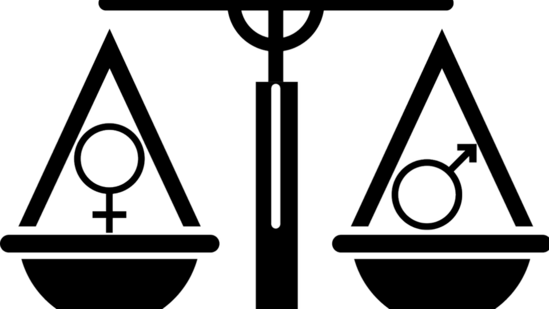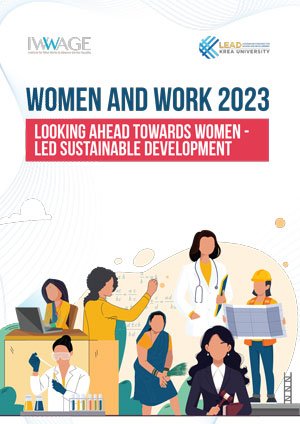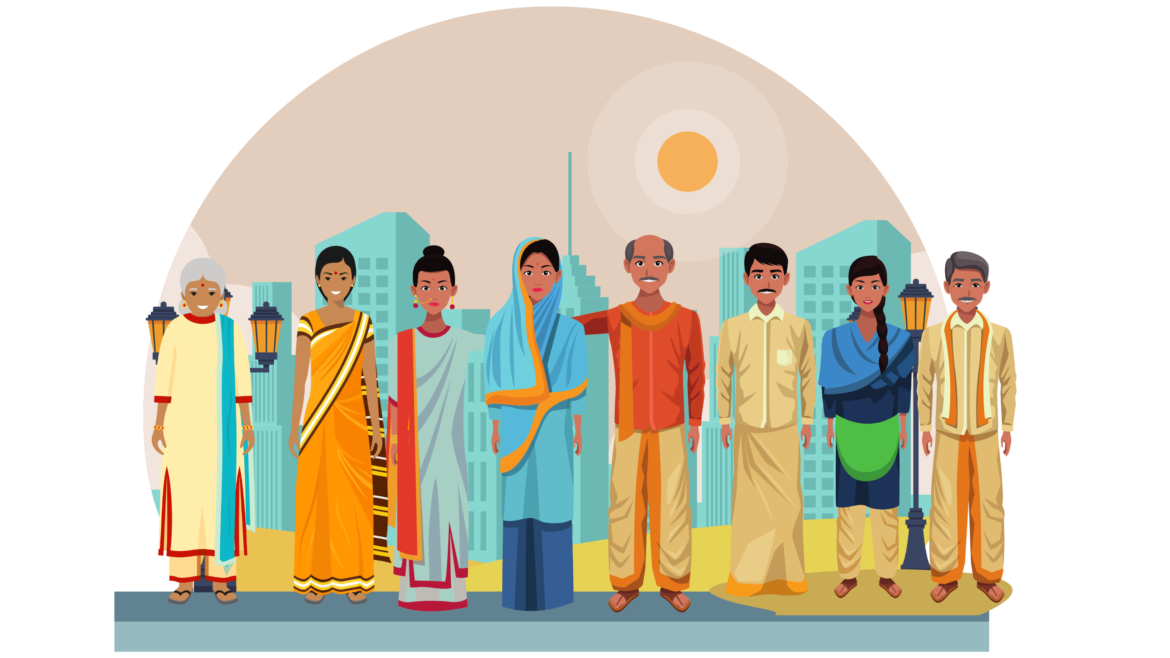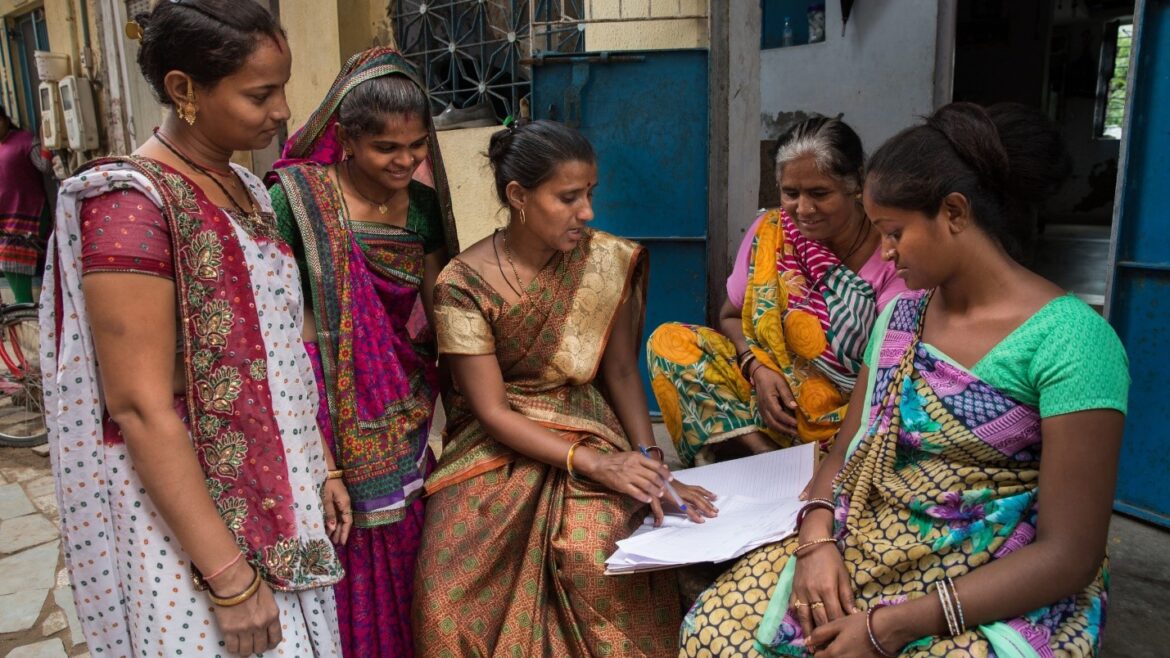IWWAGE-Institute for What Works to Advance Gender Equality
IWWAGE Trends Report 2023
In 2023, India emerged as the fastest-growing major economy globally, driven by robust employment generation, productivity gains, and sustained economic growth. Alongside this remarkable economic performance, the year brought women-led development and Nari Shakti into focus, reaffirming India’s commitment to gender equality and sustainable development. However, despite these advancements, the issue of female labour force participation remains critical.
India has long struggled with lower female labour force participation compared to global standards, with socio-economic and cultural factors limiting the full utilisation of women’s potential. Yet, recent trends offer promising signs of progress. According to the latest Periodic Labour Force Survey (2022-2023), female participation in the labour force for those aged 15 and above rose to 37%, with rural areas seeing an increase from 36.6% to 41.5%, and urban areas from 23.8% to 25.4%. More women are engaging in family-owned or self-employed work, including agriculture, contributing positively to this shift.
Additionally, 2023 witnessed significant strides towards women-led development, with a renewed push for women’s representation in Parliament and proactive policy discussions during India’s G-20 presidency. However, the journey towards true gender equality remains ongoing. Women continue to be under-represented in key sectors, particularly in science and technology, with workplaces reflecting broader economic and social inequalities.
India’s G-20 presidency adopted a gender-focused approach, aiming to reposition women not just as beneficiaries but as economic agents driving development. By embracing women-led development, India sought to shift the narrative and demonstrate the transformative potential of women in spearheading key sectors and promoting inclusive growth.
This report contextualises women’s participation in various fields within the broader political and economic landscape of 2023. It highlights the challenges and opportunities that emerged during the year and offers a forward-looking perspective on potential growth areas in 2024, recognising women as a formidable force in driving progress and prosperity.
Lack of census data and use of electoral roll-based sampling frame in specific studies
Selection of households and individuals is one of the most important tasks of developing sampling designs. Traditionally, in developing countries where population data is mostly available in the censuses conducted by the government, this information forms the basis of the house-listing done for the purpose of selection of households in a sample survey. In India as well, researchers mostly depend on the census data for constituting robust and representative sampling frames using a house-listing exercise to implement a particular sampling technique, unlike in the USA or other similar countries which already have readily available sampling frames. The house-listing process is a cumbersome process and often requires time and financial resources, which may, at times, deter researchers from using these probability-based sampling techniques and resort to purposive sampling which often may not be representative and may not provide unbiased information and data.
In this context, IWWAGE explored using electoral rolls as an alternative to using population census as sampling frames in the selection of household or individuals for some of our recent studies. Using electoral rolls for studies aimed at policy-making is a relatively new trend. In the absence of updated census data as well as to ensure minimised time and resource requirements, exploring electoral rolls as sampling frames may be useful, although its use for household surveys is relatively sparse in India (Vaishnav, 2021; Joshi et al. 2020). At IWWAGE, we have used electoral roll sampling frame for selection of individuals for the surveys in two of our studies on labour force participation. The data collection for one study, viz., ‘Women’s Labour Force Participation in Select States in India’, was conducted during November, 2021 and January, 2022 and the other one is an ongoing study on ‘Capturing women’s work to measure better’.
The completed study majorly aimed at unpacking the enablers and barriers of women’s labour force participation and suggesting actionable points based on the findings. For this study, approximately 5000 females and 1000 males were interviewed, from five states of India, namely Jharkhand, Karnataka, Delhi, Rajasthan, and Madhya Pradesh. The main objectives of the ongoing study are to capture women’s work comprehensively by identifying the varied, yet major, forms of paid and unpaid activities, listing activities by categories of work, and developing mechanism of estimating the simultaneity of engagement of women. Approximately 4000 females and 800 males have been surveyed from the states of Jharkhand and Karnataka for the study.
It is worth mentioning that, in a multi-stage cluster sampling context, selection of individuals (or households) from the electoral roll frame entails selection of polling booth in the previous stage of sample selection as opposed to more traditional approach of selecting villages in rural areas and census enumeration blocks (CEB) or urban frame survey (UFS) blocks in urban areas. In this note, we outline the advantages and challenges of using electoral rolls in selecting individuals based on our experience of conducting the two studies mentioned above.
Advantages of using electoral rolls in constructing the sampling frame
In addition to being time and cost efficient, there were multiple other advantages of using electoral-rolls as an alternative sampling frame, particularly in our studies. This technique provides us direct access to individual-level information like age, gender etc, that enables selection of a random sample, stratified on the basis of individual characteristics. It also allows us to minimise respondent bias by enabling enquiry from each individual rather than elicit information from only one member of the sample household who may then be the representative of the sampling unit and respond ‘on behalf’ of others, which may carry certain biases.
Also, the electoral-roll based sampling is a better alternative to the non-probabilistic sampling methods where sample selection often relied upon the ease of access to respondents and thus leads to a non-random, non-representative sample.
- Challenges of using electoral-rolls in constructing the sampling frame:
However, there exist a few challenges of the electoral roll-based sampling, as described below.
- Categorizing polling booths into rural and urban centers: In case of a few states, the rural-urban bifurcated list of polling booths is not directly available anywhere. In those cases, each polling booth has to be located in the Geographic Information System (GIS) software maps and categorized on the basis of information provided in the software. For example, in case of Karnataka, to know the rural/urban location of a polling booth, it has to be located in the GIS map and then the rural/urban location has to be decided depending on whether the polling booth is falling under a Hubli (indicating a rural area) or town (indicating an urban area).
- Translation from local language: In case of a few states (for example, Karnataka), where the list of polling booths and the electoral rolls are available in local languages only, translating in English and digitizing them, increase the risk of errors, and require robust monitoring and quality checks.
- Unavailability of voter rolls in convertible PDFs: Voter rolls are sometimes available online in standard PDF but in many cases, they are available as scanned copies of voter lists. These are difficult to convert into excel files, and hence sometimes entries of the listed individuals need to be done manually – increasing the cost and time in the digitization process. It also inbuilds a cost of manual supervision after the entries are completed in the excel file. In case of a large-scale coverage/nationally representative study, the manual process of making entries will be challenging.
- Challenges arising for electoral roll-,zbased sampling method while implementing the survey:
- Less frequent updating of the voter rolls: Less frequent updating of the voter rolls leads to difficulties in locating the respondents, especially in urban areas with high intra-city or inter-city out migration. Combining two of our studies, in about 20-30% instances, the respondents could not be located due to out-migration. However, as the geographical area of survey expands, this percentage comes down.
- Difficulty in locating respondents in dense settlements: In case of the densely populated urban areas, the houses located near the boundaries of the polling booths often get excluded from the electoral rolls corresponding to their own polling booth and get enrolled in the electoral rolls of the adjacent polling booths. This arises due to the fact that there is a cap on the number of voters in a polling booth and once the limit is reached, the remaining voters are to be enrolled in the neighbouring polling booth.
- Difficulty in locating women in younger age-cohort: It is also realized that locating women in the age-cohort of 18-24 years is far more difficult as compared to others. Younger women are much less likely to be listed in the voter rolls than other individuals and they also relocate more often after marriage, rendering themselves as untraceable in that particular polling booth.
- False entries: Sometimes the names or other information like age of the individuals does not match exactly leading to minor mismatch between the electoral roll entry and the original information of individuals. Also, the existence of false entries is found in the voter’s list.
- Voters not residing in the delimited area of a particular polling booth: In some cases, it is found that most of the respondents selected from the voter list of a particular booth, actually reside in a village far from the polling booth demarcated area. This is because voters in a particular area are assigned to other polling booths besides the one officially demarcated for the area.
To tackle the challenges of non-response and difficulty in locating the respondents, digitizing data of extra polling booths as buffers and preparing a list of respondents which include more numbers in addition to the required sample size for each group of respondents in each polling booth, would be a mitigating mechanism.
- Suggestions to facilitate a more convenient use of electoral rolls in constructing sampling frame:
Below are a few suggestions from our experience of using electoral rolls for constructing sampling frame to make the process more efficient:
- providing the list of polling booths and electoral rolls in English;
- indicating the rural/urban location of the polling booths in Chief electoral officer’s website;
- making the electoral rolls available in convertible PDFs; and
- more frequent updating of the electoral rolls.
Lastly an important limitation of using electoral rolls pertains to specific age cohorts. Since the electoral rolls include only the eligible voters, the sampling frame thus includes only those individuals who are 18 years and above. It would thus be relevant mainly for surveys that include specific age groups above a certain threshold.
This blog has been authored by Dr. Sona Mitra, Director- Policy and Research, IWWAGE; Dr. Bidisha Mondal, Research Fellow, IWWAGE; Prakriti Sharma, Senior Research Associate, IWWAGE; and Aneek Chowdhury, Research Associate, IWWAGE[1].
We are very thankful to Dr. Santanu Pramanick for his guidance through the process of developing a sampling frame. We are also grateful to Shri P C Mohanan for his comments in both phases of using the electoral rolls for our purpose.
IWWAGE at the 64th Annual Conference of the Indian Society of Labour Economics (ISLE) at Hyderabad, Telangana
IWWAGE at the 64th Annual Conference of the Indian Society of Labour Economics (ISLE) at Hyderabad, Telangana

IWWAGE participated in the 64th Annual Conference of the Indian Society of Labour Economics held in Hyderabad, Telangana in March 2024. The ISLE engagement included organizing a panel discussion on “care,” participation in a panel on time use methods as well as paper presentations by team members.
PANEL DISCUSSIONS
- Caring for the Caregivers: Pathways to Strengthen the Care Economy
29th March 2024
IWWAGE along with the Institute for Human Development organized a panel on “Caring for the Caregivers: Pathways to Strengthen the Care Economy” which highlighted pressing issues around care based on specific contexts, advocating for better working conditions and facilities including access to key amenities like toilets and transportation. The discussion delved into the scope and environment of care work, emphasizing the need for financing, enhanced investments, and adequate legal frameworks to protect the rights of care workers. The panel was chaired by Yamini Mishra (India Director, Mac Arthur Foundation) with introductory remarks by Sona Mitra (Research & Policy Director, IWWAGE). The panellists included Ritu Dewan (Visiting Professor, IHD), A K Shivkumar (Visiting Professor, IHD), Valeria Esquivel (Employment Policies and Gender Specialist, ILO), and Prabha Kotiswaran (Professor, King’s College London) with Dipa Sinha (Assistant Professor, Ambedkar University, Delhi) joining as a discussant. The session concluded with remarks from Radha Chellappa (Executive Director, IWWAGE) encapsulating the importance of the dialogue and its implications for policy and practice.
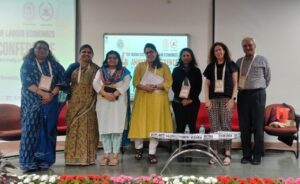
- Integrating Time Use Module with Labour Force Surveys
30th March 2024
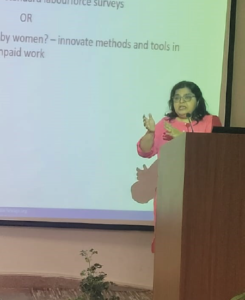
Organized by the Centre For Women’s Development Studies (CWDS), New Delhi, this panel delved into the possibilities and challenges of integrating time use data into labour force surveys, a crucial step towards understanding the unseen aspects of labour and productivity. The panel was chaired by TCA Anant (Adjunct Professor, Tata Institute of Social Sciences). Sona Mitra (Director – Policy and Research, IWWAGE) presented insights from a primary study that incorporated gendered activities and time-budget components. The esteemed panel was chaired by TCA Anant (Adjunct Professor, Tata Institute of Social Sciences) and also included the following experts: Padmini Swaminathan, Former Director, Madras Institute of Development Studies; G.C. Manna, (Professor, IHD India, Former Director General, CSO and NSSO) P.C. Mohanan (Chairman, Kerala State Statistical Commission), Kripa Ananthpur (Professor, Madras Institute of Development Studies) and Neetha N. (Professor, Centre for Women’s Development Studies).
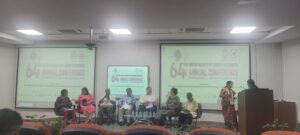
PAPER PRESENTATIONS
1. Paper Title: “Informant bias’, a key factor behind underestimation of women’s work: Evidence from two IWWAGE surveys”
Authors: Sona Mitra, Bidisha Mondal, Prakriti Sharma and Aneek Choudhury
Summary: Using two primary surveys, the paper assessed the ‘informant bias’ across various economic and non-economic participation of working-age women and further investigated how it varied across the demographic and socio-economic characteristics of individuals and households.
2. Paper Title: How care responsibilities influence women’s labour force participation and the nature of their employment: Evidences from PLFS 2022-23
Author: Bidisha Mondal
Summary: Women belonging to households with childcare responsibilities are two times more likely to stay engaged in full-time domestic duties and thus stay out of the labourforce, as compared to women without childcare responsibilities. Moreover, when women with childcare responsibilities participate in the labourforce, they are more likely to be engaged in non-remunerative opportunities like unpaid family work probably due to the flexibility these types of engagement provide. Elderly care responsibilities are found to restrain women’s labourforce participation decision and remunerative engagements marginally.
3. Paper Title: “Formalising Care Economy will have Far-Reaching Implications for Women’s Employment ”
Authors: Mridusmita Bordoloi (IWWAGE), Prof. Rajshree Bedamatta, IIT Guwahati
Summary: This paper defines the care sector and the care workforce in India, based on the definition suggested by International Labour Organisation (ILO), using unit level data from PLFS, 2022-23, and explores the characteristics of the care workers. The paper argues that if the care sector can be developed further and formalised, it can have far-reaching implications. It will not only create new job opportunities in the economy for individuals across gender, but can also work as an enabler in women’s labour market participation, which is significantly low at present.
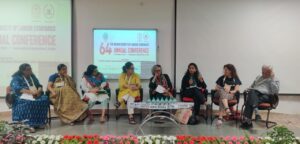
Vidhi Singh

Vidhi Singh
Research Associate
Vidhi holds a Master’s degree in Public Policy and Governance from Azim Premji University, Bengaluru. She has previously interned with SEWA Bharat and PRS Legislative Research. Before joining IWWAGE as a Research Associate, she was working in the capacity of a Research Analyst in a private consulting firm based out of Lucknow. In this role, she was involved in monitoring and evaluation research studies at the intersection of gender and health. From her schooling years, she has been active in advocating for gender rights and wants to continue working in the domain. Her areas of interest primarily include intersections of gender and data. Additionally, she describes herself as an avid consumer of Hindi cinema and is very highly influenced by the actor Shah Rukh Khan.
Capturing Women’s Work Through Time Use Surveys: Implications for Policy
Capturing Women’s Work Through Time Use Surveys: Implications for Policy
Dr. Ellina Samantroy, Fellow at VV Giri National Labour Institute, joined us for our seminar series on April 22nd, 2024 to discuss “Capturing Women’s Work Through Time Use Surveys and Further Implications for Policy Making. Dr. Samantroy laid the context by highlighting two alarming issues: the gender gap between men and women and the low participation of women in the job market. This is substantiated when we look at the figures in 2023, where 48.7% of women participated in the labor market as compared to 73% of men.
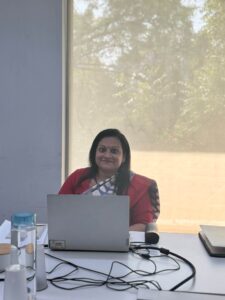
Women’s work participation was continuously decreasing since 2004-05 and then it started increasing after 2017-18. This increase can be attributed to the increased proportion of the self-employed workforce. The question now remains understanding the concentration of self-employed workforce across occupations and sectors. This can be clearly identified by using TUS (Time Use Survey) data.
Highlights from Dr. Samantroy’s seminar are shared below:
Background of TUS:
TUS is a quantitative summary of how individuals allocate their time over a specified time period- typically over 24 hours in a day or over the 7 days of a week on different activities and how much time they spend on each of these activities. Further, it diversifies activities into three categories: SNA activities (activities that fall within the production boundary of the UN System of National Accounts), non-SNA activities (activities which are not included in national accounts but are covered under the General Production boundary and include delegable production of services) and personal services (non-delegable services eg. sleeping, watching TV, etc.). TUS sheds light on the specific activities the individuals in the reference population are engaged in. It also talks about the time spent on doing certain activities like, average number of hours in a day spent on travelling and unpaid domestic work among other activities.
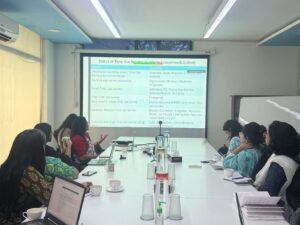
Shift from NSSO to TUS:
- Women’s work has not been documented effectively in NSSO surveys as it provides generalized answers, not delving deeply into certain probing questions. NSSO data does not provide answers for restricted women’s participation based on geographical location. Also, there is a lack of occupational segregation in the survey.
- TUS focuses on capturing unpaid domestic activity and other non-market activities.
- Additionally it provides information on multiple and simultaneous activities and some other insights using context variables. These variables look at details of the activity, specifically looking into the location, presence of other people when the activity occurred, beneficiary perception, and monetary motivation behind the activity.
- TUS gives visibility to the care economy, captures time stress, and improves workforce estimates along with throwing light on the scattered and sporadic nature of informal work. It helps in understanding the percentage of time spent on unpaid domestic and care work by sex, age group, caste, religious group, and location wise.
Highlights from National TUS 2019:
They have coded 9 activities under TUS.
- Participation rates of women workers in unpaid domestic services for household members are 94.5% and 87.9% in rural and urban areas respectively. Compared to men workers, participation rates are 33.7% and 24.6% in rural and urban areas respectively.
- The average time spent by women workers on unpaid domestic services for household members are 4.1 hours and 3.6 hours in rural and urban areas respectively. On the other hand, the average time spent by male workers on unpaid domestic services for household members are 1.6 hours and 1.5 hours in rural and urban areas respectively.
- Under the unpaid domestic services, women are involved in care and maintenance of textiles, footwear, food and meals preparation and cleaning and maintenance of surroundings across both rural and urban areas.
- The average time spent by women in unpaid domestic work is around 2.5 hours, primarily in food and meal preparation. Digging deep into unpaid caregiving services, around 20-23% of women are engaged in childcare and instruction across rural and urban areas. Additionally, the average time spent on unpaid caregiving services, specifically in childcare and instruction is around 1.7 hours across both rural and urban areas for women.
Limitations of TUS:
- Inadequate capturing of informal work
- Lack of harmonization with international classification
- Methodological limitations
- Too expensive
Recommendations:
- Addressing self-employment through TUS
- Addressing the concerns of marginalized communities across geographical regions
- Capacity building of stakeholders
- Mainstreaming TUS
- Need for revisiting and sharpening the use of context variables
If you would like to see the presentation, please visit the link here.
Incase you missed the online seminar, you may view it here.
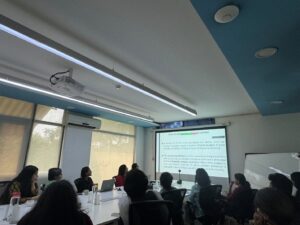
Digitization and its Effects on Female Labour Force Participation in India
India has witnessed a manifold increase in awareness and accessibility of job opportunities thanks to an increase in digitisation in all sectors. Technology has created new jobs and has made old jobs more accessible and convenient. Remote work opportunities, online training modules, and networking have become easier due to the internet, but its benefits are skewed.
This paper explores the impact of increasing digitisation on female labour force participation (FLFP). Digitalisation is associated with improving gender outcomes, alongside various socio-economic factors. Research highlights how increasing the use of digital finance, improved digital infrastructure and digital awareness has a strong positive and significant correlation with FLFP. The paper investigates opportunities provided by digitalisation for enhancing women’s economic contribution and empowerment in both rural and urban settings.
Women’s control over their economic resources: Evidence from NFHS 5
Economic violence refers to any act or behavior causing economic harm to an individual and generally involves coercive control of economic resources of a person . It is one of the many interconnected forms of violence often taking place at the domestic realm in the context of intimate relationships leading to adverse consequences on mental, physical, and financial well-being as well as other development opportunities of the victims and their dependents both in the short and long-term. This blog attempts to provide estimates of the incidence of economic violence in India based on the National Family Health Survey 5, conducted during 2019-21.
Although economic violence is now legally recognized in a few of the European Union member states like Belgium, Bulgaria, Croatia, Lithuania, Hungary, Malta, Romania, Slovenia and Slovakia and it is a commonly used tactic by perpetrators for coercive control over the victims and co-occurs with other forms of violence, it is less talked about and underreported. The under-reporting arises majorly due to the general lack of awareness about what constitutes economic violence. The gap in empirical understanding of economic violence and the factors influencing the occurrence of this form of violence also leads to a vacuum in the policy-making space through prohibitive measures to support the survivors.
There are majorly three types of economic violence categorized by the European Institute of Gender Equality: economic control which includes preventing, limiting, or controlling a victim’s finances and related decision-making; economic exploitation which means using the economic resources of a victim to the abuser’s advantage; and economic sabotage which involves preventing a victim from pursuing, obtaining, or maintaining employment and/or education. However, the identified indicators from NFHS 5 allows us to explore only the extent of economic control and economic exploitation experienced by women in India.
According to NFHS 5, 49% of women, aged between 15 to 49 years, don’t have the decision-making power on how to spend their own money. The situation is relatively better for urban women as compared to their rural counterparts since the share is relatively lower at 43% for urban women and 51% for rural women. This is because urban women face less restrictive socio-cultural norms and enjoy better agency as compared to rural women. Also, there exists vast state-wise variation when it comes to women’s control over their own money. The three states with highest shares of women with decision-making power over their own money, are Himachal Pradesh, West Bengal, and Karnataka with the shares being 62%, 61%, and 59% respectively, whereas the worst performing states are Telangana, Andhra Pradesh and Assam with the shares being 32%, 29% and 28% respectively. The state-wise patterns indicate varying levels of women’s agency and the associated socio-cultural norms across the states.
The control over one’s own money also varies among women in different age-cohorts, with the control steadily increasing with age. While only 35% women in the age-cohort of 15-19 years can decide how to spend their own money, this share rises to 59% for women in the age-cohort of 45-49 years. As women transition from young adulthood to middle age, their growing social network often make them collectively empowered, help them challenge the restrictive social norms and exercise better agency. Moreover, financial distress has been a contributing factor to the prevalence of economic violence as 54% women in the ‘poorest quintile’ reported not having the control over their own financial resources. This percentage goes down among women belonging to upper expenditure quintiles.
The partner pay gap- the difference in earnings between the partners – turns out to be a significant influencer of economic violence as women’s relative earning position tends to determine the interpersonal power dynamics within the couple. Around 65% of women who earn equal to their husbands or more than their husbands, are found to have command on how they spend their own money, and the share is 59% for those earning less than their male spouses. The findings from NFHS 5 reveal a U-shaped relationship between women’s control over their own economic resources and their education level. This implies that women at very low levels of education have better command over their economic resources as compared to women in secondary/higher-secondary levels of education; the control increases for women with graduation/post-graduation levels of education. As NFHS 5 reveals, this too can be explained by the partner pay gap. According to the data, the share of women earning more or less similar to their male spouses is high among women with lower levels of education and thus on average they enjoy better command over their economic resources. Women at secondary/higher secondary levels of education, earn much lower than their spouses on average, leading to lower agency and less control on their own economic resources, and again the ‘partner pay gap’ declines for women with tertiary level of education, leading to better agency. Additionally, as the education levels of the male spouses increases, the females are found to enjoy more decision-making power over their own earnings as educated men are supposed to conform to more gender-equal norms. Approximately 50% of women whose male spouses received no education, don’t have any command over their own money. This share goes down to 36% for women with male partners educated above the secondary level.
Another commonly found example of financial abuse is the male spouse depleting the wife’s savings without her knowledge/consent. According to NFHS 5, around 44% of women stated that they have a bank savings account of their own, but they are not in control of the money in it. This share again varies by education levels, with the share being 44% for women without any education level and the share declining to 36% for those with education level above secondary level, reflecting higher agency among educated women.
Despite the pervasiveness of low agency of women when it comes to controlling their own incomes and financial resources, the recognition of it is lower. This lack of recognition is often due to not acknowledging the exclusion as another form of discrimination and assault on women. This points to the need for generating more evidence and awareness around the various forms of exclusion both in the legal and scholarly spheres. Criminalizing economic abuse would help to send a firm message about the unacceptability of this form of violence. Allocating significant budgetary resources for training legal professionals for increasing their capacity to recognize, investigate, and prosecute economic violence would be needed to address and prevent its occurrence. Along with this, the access to the services to combat familial violence must be provided to its victims too. Lastly, we need more sophisticated surveys capturing the various dimensions of economic violence to fully comprehend the subject.
This blog is written by Aneek Choudhury, Research Associate and Bidisha Mondal, Research Fellow at IWWAGE.
Picture credit: Paula Bronstein/Getty Images/Images of Empowerment




